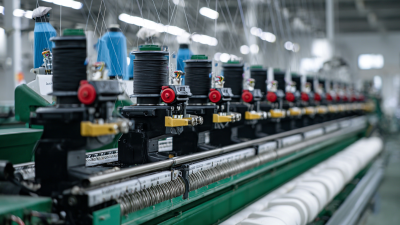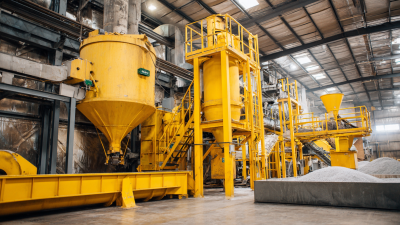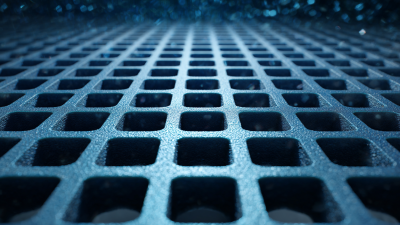The Ultimate Guide to Understanding Wire Mesh Machines and Their Applications
Table of Contents
- The Evolution of Wire Mesh Machines: A Historical Overview and Technological Advancements
- Understanding the Types of Wire Mesh Machines: Features and Functions Explored
- Key Applications of Wire Mesh Machines in Various Industries: Statistics and Insights
- Choosing the Right Wire Mesh Machine: Factors Influencing Decision-Making
- Maintenance Best Practices for Wire Mesh Machines: Ensuring Longevity and Efficiency
- Future Trends in Wire Mesh Machine Technology: Forecasts and Market Projections
- Maximizing Hygiene and Efficiency with the TM Type Towel Machine for Modern Facilities
- FAQS
- Conclusion
- Related Posts
In today’s fast-changing world of manufacturing, it's pretty important for businesses to really get a handle on how Wire Mesh Machines work, especially if they're looking to boost their production in textile and composite materials. DANYANG YIXUN MACHINERY CO., LTD is known for designing some pretty advanced multi-axial and biaxial warp knitting machines — and honestly, these machines are now pretty much essential when it comes to making high-quality stuff like glass fiber and chopped strand mats. Industry folks are saying that the global market for wire mesh products is expected to see quite a bit of growth soon, mainly because of higher demand in construction and manufacturing. When these Wire Mesh Machines run smoothly, they don’t just speed things up — they also help improve the overall quality and durability of the final products. As manufacturers start to adopt these latest techs, it’s really important to have a good understanding of how these machines work and what they can do. That way, businesses can stay competitive and keep up with the rapidly evolving market.

The Evolution of Wire Mesh Machines: A Historical Overview and Technological Advancements
Wire mesh machines have come a long way since they first appeared, reflecting all the crazy technological progress we've seen in manufacturing. Back in the day, making wire mesh was pretty much all manual work—slow and not exactly precise, plus it didn’t scale very well. Then, around the late 1800s, things started to change with the introduction of mechanized weaving machines. That was a real game-changer, speeding things up and making the quality way more consistent. In fact, a report from MarketsandMarkets says the global wire mesh market is expected to hit about $6.91 billion by 2026—that’s quite a lot, showing just how much these machines have evolved and how much more demand there is now.
Fast forward to recent years, and the tech has gotten even smarter. Modern wire mesh machines now use stuff like programmable logic controllers (PLCs) and robots—fancy terms, but basically they help make production faster and more complex designs easier to pull off. The whole Industry 4.0 thing has really stepped in, optimizing the whole process, cutting down waste, and making everything way more efficient. Plus, you’ve got machines now tailored for specific jobs—think construction, filtration, farming—they're versatile! All these upgrades don’t just boost output; they also help meet tough quality standards and push for sustainability. It’s pretty cool to see how technology continues to shape this industry, don’t you think?
Understanding the Types of Wire Mesh Machines: Features and Functions Explored
Wire mesh machines are pretty crucial across a bunch of industries, and they come with a bunch of features to suit different needs. There are different types of these machines, each built for specific jobs. For example, welding machines are designed to make sturdy wire mesh by fusing the wire intersections together with high-temperature welding. They do a great job of ensuring the mesh is both precise and tough, making them perfect for stuff like construction, fencing, or industrial applications.
Then there are weaving machines, which basically interlace wires to produce things like filters and sieves. The cool thing is they can be adjusted for different wire sizes and patterns, so manufacturers can really customize their products based on what their customers want. Plus, you’ve got automated production lines that combine several processes, making the whole production way more efficient and streamlined. All these machines are super important because they help meet a wide range of market demands, really showing how versatile and vital wire mesh technology is in today’s manufacturing world.
Key Applications of Wire Mesh Machines in Various Industries: Statistics and Insights
Wire mesh machines are honestly pretty vital across a bunch of different industries. They make those essential products we see everywhere—from building sites to farms. The market for these machines has been on a pretty steady rise lately, mostly thanks to more infrastructure projects and stronger security needs. If you look at the latest reports, it’s clear the demand for machinery used in making barbed wire is only going up—especially as farming and security industries keep growing. Experts also expect ongoing innovation, like more energy-efficient machines, through at least 2034.
But it’s not just about barbed wire. These wire mesh machines are also super important for producing things like transparent conductive films, which are key in modern electronics. The market for these films is expected to hit some serious numbers by 2032. Materials like Indium Tin Oxide on PET are leading the charge because they work so well and support electronic gadgets. The data shows that investing in the latest tech is crucial if industries want to keep up with evolving needs. Companies like DANYANG YIXUN MACHINERY CO., LTD are really pushing the envelope with their innovative multi-axial and stitch bonding machines, which are becoming more important than ever.
The Ultimate Guide to Understanding Wire Mesh Machines and Their Applications
| Industry | Application | Market Share (%) | Growth Rate (2023-2028) (%) | Key Insights |
|---|---|---|---|---|
| Construction | Reinforcement Mesh | 25% | 5.2% | Increasing demand for safety and structural integrity. |
| Agriculture | Animal Enclosures | 18% | 4.3% | Focus on humane, durable solutions for livestock safety. |
| Mining | Wire Mesh Screens | 20% | 6.1% | Enhanced filtration and sorting capabilities required. |
| Food & Beverage | Filtration Systems | 15% | 3.5% | Strict hygiene standards driving demand for advanced filtration. |
| Automotive | Grille and Bumper Mesh | 12% | 4.8% | Demand for lightweight and durable materials increasing. |
Choosing the Right Wire Mesh Machine: Factors Influencing Decision-Making
When you're trying to pick out the right wire mesh machine, there are actually quite a few important factors you should keep in mind. First off, think about what you’re gonna be using it for. Recent industry reports show that demand for wire mesh is on the rise—especially in areas like construction, farming, and industrial filtration. In fact, it's growing around 5.6% a year! That means you need a machine that can handle different materials and meet various specifications. So, ask yourself: are you making standard mesh products, or do you need something more customized for specific jobs?

Another thing to consider is how much the machine can produce and how efficient it is. According to Smithers Pira, modern machines are pretty impressive—they can crank out over 300 meters of wire mesh per minute without sacrificing quality. That sort of speed not only helps cut down operational costs but also makes it easier for manufacturers to keep up with growing demand. Plus, investing in automation features can boost productivity even more and cut down on labor costs. So, if you think about it all, choosing the right machine really comes down to balancing these factors with your business goals and what’s happening in the market. It’s all about finding that sweet spot for your needs.
Maintenance Best Practices for Wire Mesh Machines: Ensuring Longevity and Efficiency
Taking good care of your wire mesh machines is really important if you want them to last longer and work efficiently. It’s a good idea to do regular check-ups to spot any wear and tear on key parts like bearings, wires, and welding mechanisms. Keeping these in top shape can really help prevent unexpected breakdowns, which, let’s be honest, can be a real nightmare and costly too. Plus, cleaning the machine surfaces regularly to get rid of dust and debris helps everything run smoothly without hiccups.
Another biggie is lubrication. Making sure you're using the right lubricants for each part not only cuts down on friction but also boosts overall performance and lifespan of the machine. Just sticking to the manufacturer’s maintenance tips and recommended lubricant types makes a huge difference. It’s also really valuable to train operators on the best ways to care for the equipment. That way, they can catch potential issues early on and fix them before they turn into bigger problems. Spending some time and a little money on good maintenance really pays off — you’ll see better product quality and save on operational costs in the long run.
Future Trends in Wire Mesh Machine Technology: Forecasts and Market Projections
So, looking ahead, the future of wire mesh machine tech is really getting more and more connected with advances in hardware and automation. As everyone’s looking for faster, energy-smart machines, industries seem to be shifting towards more innovative manufacturing methods. For example, the market for barbed wire machines is expected to do pretty well, especially since there's a rising demand from agriculture, security, and infrastructure sectors. And with new innovations, these machines are becoming more productive and sustainable at the same time.

On top of that, we're starting to see AI and machine learning being stepped into these machines, which could totally change how everything runs. These tech upgrades are aimed at making operations smoother and more automated, which will shake up supply chains and change the way we think about labor. Plus, with electric and adaptable systems gaining popularity, manufacturers are gearing up to adopt smarter tech that not only boosts efficiency but also helps the environment. Looking at where this market is headed, it definitely seems like there's lots of potential for growth—especially with the growing complexity of industrial needs pushing tech to adapt faster than ever.
Maximizing Hygiene and Efficiency with the TM Type Towel Machine for Modern Facilities
The TM Type Towel Machine is a cutting-edge solution designed to maximize hygiene and efficiency in modern facilities. With the production of towel textiles becoming increasingly vital, this machine stands out for its ability to produce high-quality towels at varying speeds and widths, making it a versatile choice for manufacturers. Equipped with a gauge option of F10 or F12, it caters to diverse production needs, ensuring that users can achieve the desired towel texture and absorbency.
Operating at speeds ranging from 50 to 600 r/min, the TM Type Towel Machine is capable of adapting its speed based on the raw materials and end products, thereby optimizing production efficiency. With a robust design featuring four bars and an EL-pattern drive for precise pattern creation, this machine not only ensures consistent quality but also enhances the overall production process. This makes it an essential asset for facilities striving for excellence in hygiene and operational efficiency.
FAQS
: Wire mesh machines are essential in various industries, including construction, agriculture, and security.
The growth is driven by increased infrastructure development and heightened security measures.
The demand is rising due to the expansion of sectors such as agriculture and security.
They are pivotal in manufacturing transparent conductive films, which are crucial for electronic components.
Regular inspections, routine cleaning, proper lubrication, and operator training are key maintenance practices.
Using suitable lubricants reduces friction and enhances both performance and operational lifespan.
Advancements in automation and the integration of AI and machine learning are anticipated to redefine operational efficiencies.
There is a trend towards high-speed, energy-efficient machines and smart technologies that promote sustainability.
The market is expected to thrive due to growing needs in agriculture, security, and infrastructure with innovations improving productivity.
Investment is vital for meeting the evolving requirements of industries, emphasizing the need for advanced machinery.
Conclusion
Hey, have you ever come across the article titled "The Ultimate Guide to Understanding Wire Mesh Machines and Their Applications"? It's actually pretty interesting. It walks you through how wire mesh machines have evolved over time, touching on the cool tech upgrades they've seen along the way. The piece dives into the different types of these machines, pointing out what makes each kind unique and what they’re typically used for. It’s packed with useful insights and some solid industry stats, which really help you get a better idea of how these machines are applied across various fields. Plus, it covers some key tips on what to keep in mind when picking the right machine for your needs—because let’s face it, making the right choice matters. They also talk about proper maintenance practices—because nobody wants a machine breaking down on them, right? To top it off, the article touches on future trends in wire mesh tech, which is great for manufacturers or professionals looking to stay ahead of the game.
And speaking of expertise, DANYANG YIXUN MACHINERY CO., LTD is a big name in the field. They specialize in making multiaxial and biaxial warp knitting machines—and that includes those used for wire mesh stuff like glass fiber or textiles. The article wraps up with some predictions about what’s next in the world of wire mesh machines, aiming to give folks in the industry a heads-up on upcoming market shifts.
Related Posts
-

Unlocking Efficiency: Essential Strategies for Sourcing Spare Parts for Warp Knitting Machines
-

How to Optimize Your Production Line Efficiency with a Multifunction Batching Device
-

Challenges Encountered with Glass Fiber Grille in Global Market
-

How to Master Warp Knitting Techniques for Unique Handmade Creations
-

7 Best Uses for Separate Needle in Modern Manufacturing
-

7 Best Practices for Maximizing Efficiency with Raschel Warp Knitting Machines


